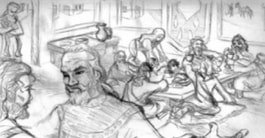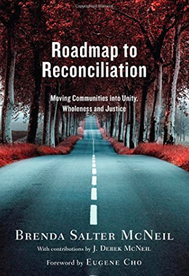When Jesus called his disciples to “follow me and I will make you become fishers of men” (Mark 1:17), most assume a positive evangelistic outcome of reaching people for Christ. Nothing could be further from the reality behind Jesus’ intentions in calling out followers to be such witnessing-fishers. At least the benign, banal application of making this verse a proof-text for “witnessing” is a shallow and narrow application of Jesus’ powerful imagery cast in this tremendous text.
Tax collectors are outsiders; rich they might have been, but they were in the eyes of temple leadership, traitors to God and to God’s people. Yet, the sinners are most certainly the uneducated serfs and peasants, farmers, and those who lived on the margins of life in and around Jesus’ house in Capernaum of Galilee (2:15). One cannot spin from this text a general characteristic that “sinners” are all sinners anywhere you find them. As are the "tax collectors," they are a specific demographic associated with those living as the poor and marginal of Jesus’ day. Jesus’ response, then, takes on an ominous shadow—a fisher shadow, standing on the shore, cast into the waters of those that are "healthy." True fisher-followers of Jesus will not rationalize their standing in the community nor their affluence, but will count their privilege, their advantage, at the disposal of the “sick” who need a physician. Paul is not far from the same imagery when he describes how Jesus took his advantage (his privilege) and gave it all on behalf of all those with the greatest of disadvantage. Have this attitude in yourselves which was also in Christ Jesus, who, although He existed in the form of God, did not regard equality with God a thing to be grasped, but emptied Himself, taking the form of a bond-servant, and being made in the likeness of men. Being found in appearance as a man, He humbled Himself by becoming obedient to the point of death, even death on a cross (Phil 2:5-8). Most likely Amos 4:1-2 is one of the underpinning Old Testament referents that would have given the disciples a frame, a rather menacing edge, for understanding the potency of Jesus’ call on their lives. In view of the inclusion (contextually) of Amos 4:1, namely the “cows of Bashan” referent, I have become wary of the poorly distributed resources, talents, and wealth among the richer, more affluent churches at the expense of the poorer churches, neighborhoods, and urban mission fields. By “expense” I am thinking biblically, not culturally, socially or (heaven forbid) politically, nor through the lens of class, but by the very New Testament discipleship implications, namely that those with advantages (“privilege,” if I may) who are called by their association with Jesus to help those who are at a disadvantage. The assumption that it takes more money to reach the rich and affluent than the poor is turned on its head by the very presence of the Kingdom (cf. Mark 1:17 with Mark 1:14-15). A more gospel-centered and mature view of discipleship seem to argue that it takes far more resources to go into the poor urban fields to bring forth a harvest for the gospel of the kingdom. These are under-resourced communities in every imaginable aspect of life. As affluent Christians, we tend to justify our station in life as a combination of gift and hard work and hear any talk of “privilege” as a justification of those of lesser means, with poorer gifts, and perhaps, with what we perceive, a lesser work ethic to grab what we have for themselves. Is there no wonder the affluent in the days of both Amos and Jesus attempted to rid themselves of the troublemakers who upset the "healthy's" status quo? This will be the lot of fisher-follows of Jesus in any culture. Following Jesus, as the gospel is imagined by Mark (and the other Gospel writers), put us at odds with everything we hold dear, in particular those who have the advantage in resources are to empty themselves on behalf of those who are at a disadvantage (cf. Phil 2). The fisher-follower mission is toward the sick (of our society), not the healthy (in our society)—toward the disadvantaged and not the advantaged. Michael Card prophetically reflects this Marken view of Jesus and the gospel in the words of his song, The Stranger:
For a youtube of Michael Card's "The Stranger" >> Click here *See chapter 3, “‘You Will Appear as Fishers’ (Mark 1:17): Disciples as Agents of Judgment,” in my Wasted Evangelism for a further and more detailed study of the Mark 1:17 “fishers of men” passage.
0 Comments
|
AuthorChip M. Anderson, advocate for biblical social action; pastor of an urban church plant in the Hill neighborhood of New Haven, CT; husband, father, author, former Greek & NT professor; and, 19 years involved with social action. Archives
February 2024
Categories
All
|
Pages |
More Pages |
|



 RSS Feed
RSS Feed